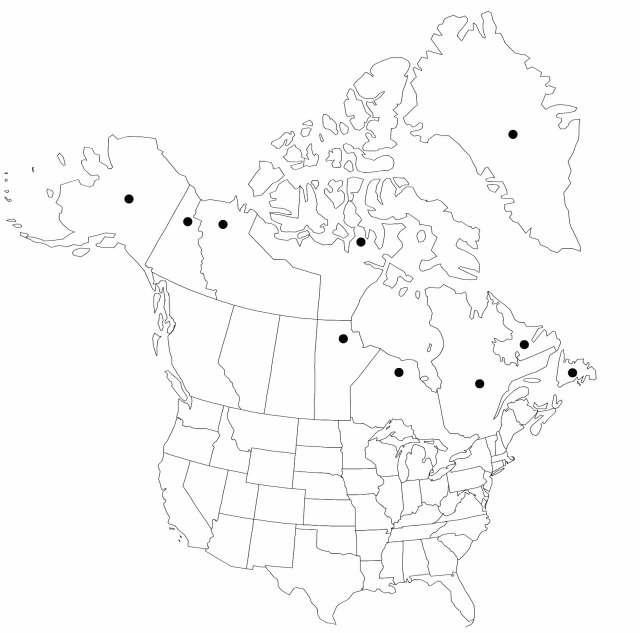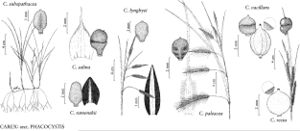Difference between revisions of "Carex subspathacea"
in G. C. Oeder et al., Fl. Dan. 9(26): 4, plate 1530. 1816.
FNA>Volume Importer |
FNA>Volume Importer |
||
| Line 55: | Line 55: | ||
|publication year=1816 | |publication year=1816 | ||
|special status= | |special status= | ||
| − | |source xml=https://jpend@bitbucket.org/aafc-mbb/fna-data-curation.git/src/ | + | |source xml=https://jpend@bitbucket.org/aafc-mbb/fna-data-curation.git/src/f6b125a955440c0872999024f038d74684f65921/coarse_grained_fna_xml/V23/V23_674.xml |
|genus=Carex | |genus=Carex | ||
|section=Carex sect. Phacocystis | |section=Carex sect. Phacocystis | ||
Revision as of 19:09, 24 September 2019
Plants not cespitose. Culms obtusely angled, 3–15 cm, glabrous. Leaves: basal sheaths brown; sheaths of proximal leaves glabrous, fronts lacking spots and veins, apex U-shaped; blades epistomic, strongly involute, 1–2 mm wide, adaxially papillose. Proximal bract longer than inflorescence, 1–3 mm wide, spathelike at base and enclosing spike. Spikes erect; staminate 1(–2); pistillate 1–3; proximal pistillate spike 0.5–1.4 cm × 2–4 mm, base cuneate. Pistillate scales bright brown to dark purple-brown, 2–3.6 × 0.9–1.5 mm, wider than perigynia, midvein reaching apex, 1/5–1/2 the width of scale, apex acute, rarely acuminate, mucronate to short-aristate. Perigynia ascending, pale brown, sometimes with purple-brown spots on apical 1/2, veinless, somewhat inflated, loosely enclosing achenes, narrowly ellipsoid to narrowly ovoid, 2.7–3.3(–3.6) × 1–1.8 mm, leathery, dull, base with stipe to 0.3 mm, apex acute, short-papillose; beak widely conic, 0.1–0.3 × 0.3–0.5 mm. Achenes entire to slightly constricted on margins, apex truncate to retuse, dull; style base straight, rarely bent. 2n = 78, 80–83.
Phenology: Fruiting Jun–Aug.
Habitat: Saline shores, salt marshes, mainly on small pool margins, rarely on open tundra
Elevation: 0–300 m
Distribution

Greenland, Man., Nfld. and Labr., N.W.T., Nunavut, Ont., Que., Yukon, Alaska, Eurasia.
Discussion
Carex subspathacea is evidently, with C. rufina, the smallest species of sect. Phacocystis. Larger plants with one to two staminate spikes and some bisexual spikes frequently occur in Ungava Bay, Hudson Bay, Northwest Territories, and Alaska, but their perigynium and achene characteristics are typical of C. subspathacea.
The following hybrids have been examined and are recognized: Carex ×flavicans F. Nylander (= C. subspathacea × C. aquatilis), C. ×arctophila F. Nylander (= C. subspathacea × C. bigelowii), C. ×subreducta E. Lepage, (= C. subspathacea × C. bigelowii), C. ×reducta S. Drejer (= C. subspathacea × C. nigra), C. ×dumanii E. Lepage (= C. subspathacea × C. paleacea), C. ×kenaica E. Lepage (= C. subspathacea × C. ramenskii), C. ×soerensenii E. Lepage (= C. subspathacea × C. rariflora), C. ×gauthieri E. Lepage (= C. subspathacea × C. recta), C. ×persalina E. Lepage (= C. subspathacea × C. salina).
Selected References
None.
